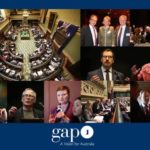Indigenous ‘lifestyle choices’ and the LNP’s paternalism
Tony Abbott recently described living in remote Indigenous communities as a lifestyle choice. Jordan Ayres says Australian social policy under the Liberal Party continues its paternalistic approach to the difficulties rural communities are facing.
Tony Abbott last month announced support for West Australian policy to forcibly close remote Indigenous communities, saying that it is not “the taxpayer’s job to subside people’s lifestyle choices”. Mr. Abbott suggests that relocation of Indigenous people into urban settings would be a more ‘cost effective’ solution to complex issues experienced in Indigenous communities.
Similarly to the Howard Government’s ‘Northern Territory Intervention’ in 2007, Indigenous Australians are once again facing paternalistic approaches toward issues experienced within rural communities. Despite the United Nations Declaration of the Rights of Indigenous Peoples (whereby Australia is a signatory), promoting Indigenous peoples’ right to land and communities, Australian social policy under the Liberal National Party (LNP) continue to insinuate ‘assimilation’ ideologies and paternalistic approaches to difficulties faced in rural communities.
The importance of promoting the continuance of culture within Aboriginal communities is well documented by academics (Lawrence, 2006., Maddison, 2009 & Durey., Wynaden., & O’Kane, 2014). Maddison (2009) found that policy that promotes the attachment of Aboriginal people to their culture prove better outcomes in both physical and mental health. Collectivism and community is a large part of Aboriginal culture (Lawrence, 2006 & Durey et al., 2014).
Important elements of Aboriginal cultural practice involves closeness, connectedness and involvement with the environment, a need which is facilitated by the remote location of many communities (Lawrence, 2006 & Maddison, 2007). Yet, despite the plethora of knowledge on the importance of culture and community to Indigenous Australians, the Australian Government continue to “pick and choose” what information they deem relevant and promote ‘top-down’, paternalistic approaches to policy (Dodson, 2005., Lawrence, 2006 & Maddison, 2007).
Since the signing of the Declaration on the Rights of Indigenous Peoples, the Australian Government has sought out government and community input to create the ‘Close the Gap’ reports in the attempt to adhere to international responsibilities (Australian Human Rights Commission, 2015). Article 8 of the Declaration (2007) outlines Indigenous peoples’ right to continue cultural practices, and that States have an obligation not to create/allow:
- Any action which has the aim or effect of dispossessing them of their lands, territories or resources;
- Any form of forced population transfer which has the aim or effect of violating or undermining any of their rights;
- Any form of forced assimilation or integration
(United Nations, 2007).
Despite international obligations, current policy continues to reflect paternalistic ideologies: the mass removal of Aboriginal children in the Northern Territory Intervention and now the forcible relocation of Indigenous Australians from their native land (ABC, 2015).
Following the Northern Territory Intervention, Maddison (2009) discussed how paternalistic approaches have fostered dependency rather than self-determination, continue to disempower rather than empower and create further difficulties for Aboriginal and Torres Strait Islander peoples. Furthermore, Atkinson (2002) suggested the paternalistic policies continue to re-traumatise Aboriginal peoples.
Similarly to his predecessor Prime Minister, John Howard, Mr. Abbott has announced he ‘stands firm’ on his position, despite the clear breach of Indigenous peoples’ rights (ABC, 2015). It appears that despite 200 years of history, the LNP Government is continuing the mistakes of colonisation, with paternalistic and racist approaches to social policy regarding Indigenous Australians.
References
- Atkinson, J. (2002). Trauma Trails, Recreating song lines: The Intergenerational effects of Trauma in Indigenous Australia. Spinifex Press, Melbourne
- Dodson, P. (2005). Speech to the National Reconciliation planning Workshop, Old parliament House, Canberra, 31 May
- Durey, A., Wynaden, D., & O’Kane, M. (2014). Improving forensic mental health care to Indigenous Australians: Theorizing the intercultural space. Journal of Psychiatric and Mental Health Nursing, 21(4), 296-302. doi:10.1111/jpm.12105
- Lane, S. (2015, March, 11). PM’s ‘lifestyle choice’ comments wrong but highlight important debate, says chief adviser. ABC News
- Lawrence, C. (2006). The importance of respecting indigenous culture. Developing Practice. The Child, Youth and Family Work Journal, (16), 5-8
- Maddison, S. (2009). Black politics: Inside the complexity of aboriginal political culture. Crows Nest, N.S.W: Allen & Unwin
- Martin, S and Owens, J. (2015, March, 11). Remote communities a lifestyle choice: Tony Abbott. The Australian
- United Nations, Office of the High Commissioner for Humans Rights. (2007). Declaration of the Rights of Indigenous Peoples 2007
Jordan Ayres is a QUT Student of social work and psychology and works as a youth worker at Brisbane Youth Service. She currently works in crisis intervention/housing and case management in Mental Health. Jordan has a passion for working nationally and internationally with Indigenous communities creating culturally appropriate and sustainable development, promoting human rights and social justice. She also has a passion for working toward equality for women and in the area of trauma and re-empowerment.












Max Thomas
April 18, 2015 at 3:49 am
Indigenous “lifestyle choices”
Jordan, it is interesting to contrast what you have written about the Howard and Abbott government policies, with Dr Gary Foley's statement that "a vast army of non-Aboriginal peoples are the ones who have benefited from the majority of the annual spending. He said Aboriginal peoples are the last to benefit, if it all. A vast white army larger than the Aboriginal population, an army of missionaries, mercenaries, misfits and parasites have been consuming the monies which were meant for Aboriginal peoples.” Dr Foley was talking about the history of an 'industry' that has grown up over decades under both Labor and Liberal (conservative) governments. Some of the responsible Ministers on both sides have been very admirable and dedicated people. So the apparent decline in Aboriginal health and education or employment opportunities cannot be attributed simply to a lack of resources. It would be refreshing to read a clear statement of what you believe to be the way forward, based on the premises you have outlined.
Anti Cupiditas
May 6, 2015 at 1:15 pm
indigenous communities lifestyle
May I suggest you finish your studies before making comments & twisted quotes on issues you so obviously know nothing about. Take note of Max Thomas's words on this, he is right.